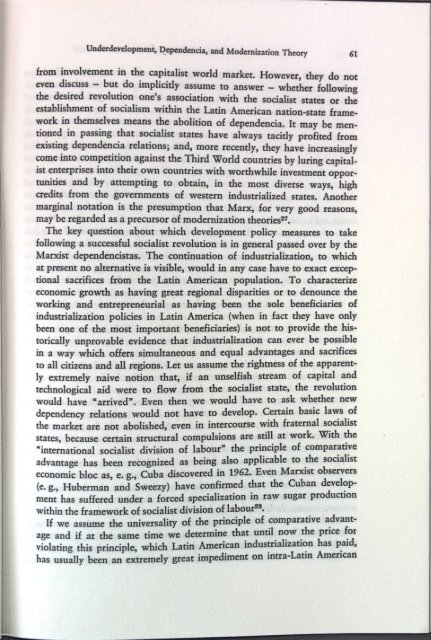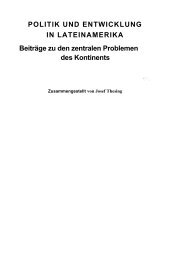9_Law and State_Volume 17
Create successful ePaper yourself
Turn your PDF publications into a flip-book with our unique Google optimized e-Paper software.
Underdevelopment, Dcpendencia, <strong>and</strong> Modernization Theory 61<br />
from involvement in the capitalist world market. However, they do not<br />
even discuss - but do implicidy assume to answer - whether following<br />
the desired revolution one s association with the socialist states or the<br />
establishment of socialism within the Latin American nation-state framework<br />
in themselves means the abolition of dependencia. It may be mentioned<br />
in passing that socialist states have always tacitly profited from<br />
existing dependencia relations; <strong>and</strong>, more recently, they have increasingly<br />
come into competition against the Third World countries by luring capitalist<br />
enterprises into their own countries with worthwhile investment opportunities<br />
<strong>and</strong> by attempting to obtain, in the most diverse ways, high<br />
credits from the governments of western industrialized states. Another<br />
marginal notation is the presumption that Marx, for very good reasons,<br />
may be regarded as a precursor of modernization theories27.<br />
The key question about which development policy measures to take<br />
following a successful socialist revolution is in general passed over by the<br />
Marxist dependencistas. The continuation of industrialization, to which<br />
at present no alternative is visible, would in any case have to exact exceptional<br />
sacrifices from the Latin American population. To characterize<br />
economic growth as having great regional disparities or to denounce the<br />
working <strong>and</strong> entrepreneurial as having been the sole beneficiaries of<br />
industrialization policies in Latin America (when in fact they have only<br />
been one of the most important beneficiaries) is not to provide the historically<br />
unprovable evidence that industrialization can ever be possible<br />
in a way which offers simultaneous <strong>and</strong> equal advantages <strong>and</strong> sacrifices<br />
to all citizens <strong>and</strong> all regions. Let us assume the rightness of the apparently<br />
extremely naive notion that, if an unselfish stream of capital <strong>and</strong><br />
technological aid were to flow from the socialist state, the revolution<br />
would have “arrived”. Even then we would have to ask whether new<br />
dependency relations would not have to develop. Certain basic laws of<br />
the market are not abolished, even in intercourse with fraternal socialist<br />
states, because certain structural compulsions are still at work. With the<br />
“international socialist division of labour” the principle of comparative<br />
advantage has been recognized as being also applicable to the socialist<br />
economic bloc as, e. g., Cuba discovered in 1962. Even Marxist observers<br />
(e. g., Huberman <strong>and</strong> Sweezy) have confirmed that the Cuban development<br />
has suffered under a forced specialization in raw sugar production<br />
within the framework of socialist division of labour-8.<br />
If we assume the universality of the principle of comparative advantage<br />
<strong>and</strong> if at the same time we determine that until now the price for<br />
violating this principle, which Latin American industrialization has pai ,<br />
has usually been an extremely great impediment on intra-Latin American
















